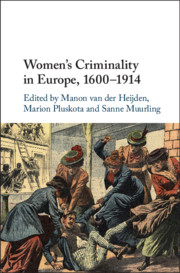Refine search
Actions for selected content:
5 results
Court Curbing Lower State Courts in the United States
-
- Journal:
- State Politics & Policy Quarterly ,
- Published online by Cambridge University Press:
- 13 November 2025, pp. 1-20
-
- Article
-
- You have access
- Open access
- HTML
- Export citation
CHAPTER EIGHT - Challenges to Embedding
-
- Book:
- The Social Constitution
- Published online:
- 15 June 2023
- Print publication:
- 29 June 2023, pp 164-181
-
- Chapter
-
- You have access
- Open access
- HTML
- Export citation
Punitive Processes? Judging in Thai Lower Criminal Courts
-
- Journal:
- Asian Journal of Law and Society / Volume 8 / Issue 2 / June 2021
- Published online by Cambridge University Press:
- 21 September 2020, pp. 324-347
-
- Article
- Export citation

Women's Criminality in Europe, 1600–1914
-
- Published online:
- 10 January 2020
- Print publication:
- 30 January 2020
4 - How Lower Courts Respond to a Change in a Legal Rule
-
-
- Book:
- Selection and Decision in Judicial Process around the World
- Published online:
- 04 December 2019
- Print publication:
- 19 December 2019, pp 110-131
-
- Chapter
- Export citation
